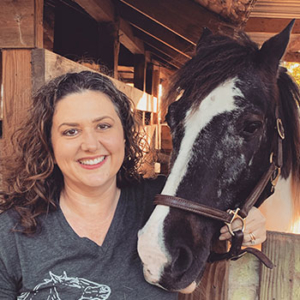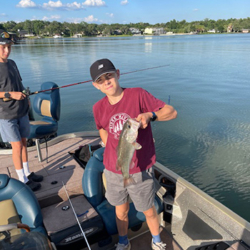 I am a horse owner once again. Taking on this hobby when I did seemed fitting. Caballero came along in March 2020 at the height of COVID-19-related shelter-in-place and social distancing recommendations. He provided opportunities to be outdoors when there weren’t many other recreational options. Horse ownership requires a serious time commitment, so it’s no surprise to me that I find myself comparing lots of things to horses these days. Following are some lessons horses have taught me in the past year about financial planning.
I am a horse owner once again. Taking on this hobby when I did seemed fitting. Caballero came along in March 2020 at the height of COVID-19-related shelter-in-place and social distancing recommendations. He provided opportunities to be outdoors when there weren’t many other recreational options. Horse ownership requires a serious time commitment, so it’s no surprise to me that I find myself comparing lots of things to horses these days. Following are some lessons horses have taught me in the past year about financial planning.
Work with a professional.
I quickly realized that my four-legged friend was more “go” than “whoa,” a marked difference from my last horse. He’s stubborn and dominant. He needed better manners, and I had to learn how to teach him those manners. I hired a trainer for both of us.
You should hire a professional to help plan your financial future. I could’ve worked alone with my horse through trial and error, and you could do that with your finances. Trial and error with a horse may get me hurt. Trial and error with your finances may hurt your nest egg.
Every expert has an opinion.
More importantly, opinions among experts may often conflict. One horse owner tells me I’m giving my horse the wrong feed; another says the feed is fine. A veterinarian says a mixture of two ointments will heal a rash; a trainer insists a clay compound will do the trick faster.
Horse experts are like financial advisors: There are many out there and there are many ways to work toward your financial goals, so find the professional whom you believe best understands your goals, and whose approach most closely mirrors your investment style.
Don’t give in.
 My horse refused to cross a shallow creek on a recent trail ride. A friend coached me through getting him to take a step into the water. It took a long, long time. She said I couldn’t give in. He had to cross that creek because if he didn’t, I’d be teaching him that if he could resist my command for 20 minutes, he could get his way. Next time, it would take me even longer to get him across a creek.
My horse refused to cross a shallow creek on a recent trail ride. A friend coached me through getting him to take a step into the water. It took a long, long time. She said I couldn’t give in. He had to cross that creek because if he didn’t, I’d be teaching him that if he could resist my command for 20 minutes, he could get his way. Next time, it would take me even longer to get him across a creek.
What a metaphor for financial goals. The quicker you give in to impulse purchases or buying things on credit today, the longer it takes to get over that debt hurdle to financial freedom tomorrow.
Walk before you run.
It’s shocking, the muscles that get sore when getting back into riding. In the beginning, a 4-mile trail ride left me with sore shoulders, arms and legs. Before I let him gallop, I needed to feel strong and confident enough to stay in the saddle at slower speeds.
The same is true for many clients who’ve been bitten by the investing bug. They see opportunity in up-and-coming companies and want to pursue stock purchases with gusto. A responsible financial advisor will encourage clients to address debt and build an emergency fund first, then save for retirement. Once those areas are addressed, you might consider dabbling in stocks.
Be patient.
 Horses are fast learners when provided accurate, consistent training. Time-consuming life commitments mean I’m unable to work my horse daily. That means a lesson may take longer to solidify in his mind, which requires patience on my part.
Horses are fast learners when provided accurate, consistent training. Time-consuming life commitments mean I’m unable to work my horse daily. That means a lesson may take longer to solidify in his mind, which requires patience on my part.
Patience is integral to investing, too. Every dot-com disaster, housing bubble burst and pandemic sends countless investors into a frenzy. They ask advisors about selling stocks and moving investments into cash. A look at the Dow Jones Industrial Average since the early 1900s shows peaks and valleys, but the overall trend remains upward (the Compliance Department wants me to remind you here that past performance isn’t an indication of future performance). Be patient. Trust your advisor to guide you through tumultuous times because you trusted her/him to develop a financial plan that is unique to your individual needs.
Make the right thing easy, the wrong thing difficult, and provide calm correction.
When Caballero does something incorrect during training, I apply pressure. When he does something correctly, I release the pressure and offer praise. Eventually he understands that doing the right thing requires less work of him than doing the wrong thing.
Creating a financial plan to work toward your goals ought to make doing the right thing easy, too. Occasionally, someone will do the wrong thing, like finance a new car after they’ve said they want to become debt-free. I’ve learned everyone won’t adhere to their financial plan as strictly as I’d like. I remind myself to calmly return to the plan we created and remind my client of their goals.
Continued, diligent effort pays off in horsemanship and in working toward your financial goals. Stay the course until you get to the finish line, and you just might be rewarded for your effort.
January 2021
Content in this material is for general information only and not intended to provide specific advice or recommendations for any individual. All indices are unmanaged and may not be invested into directly. No strategy assures success or protects against loss. Investing involves risk including loss of principal.




